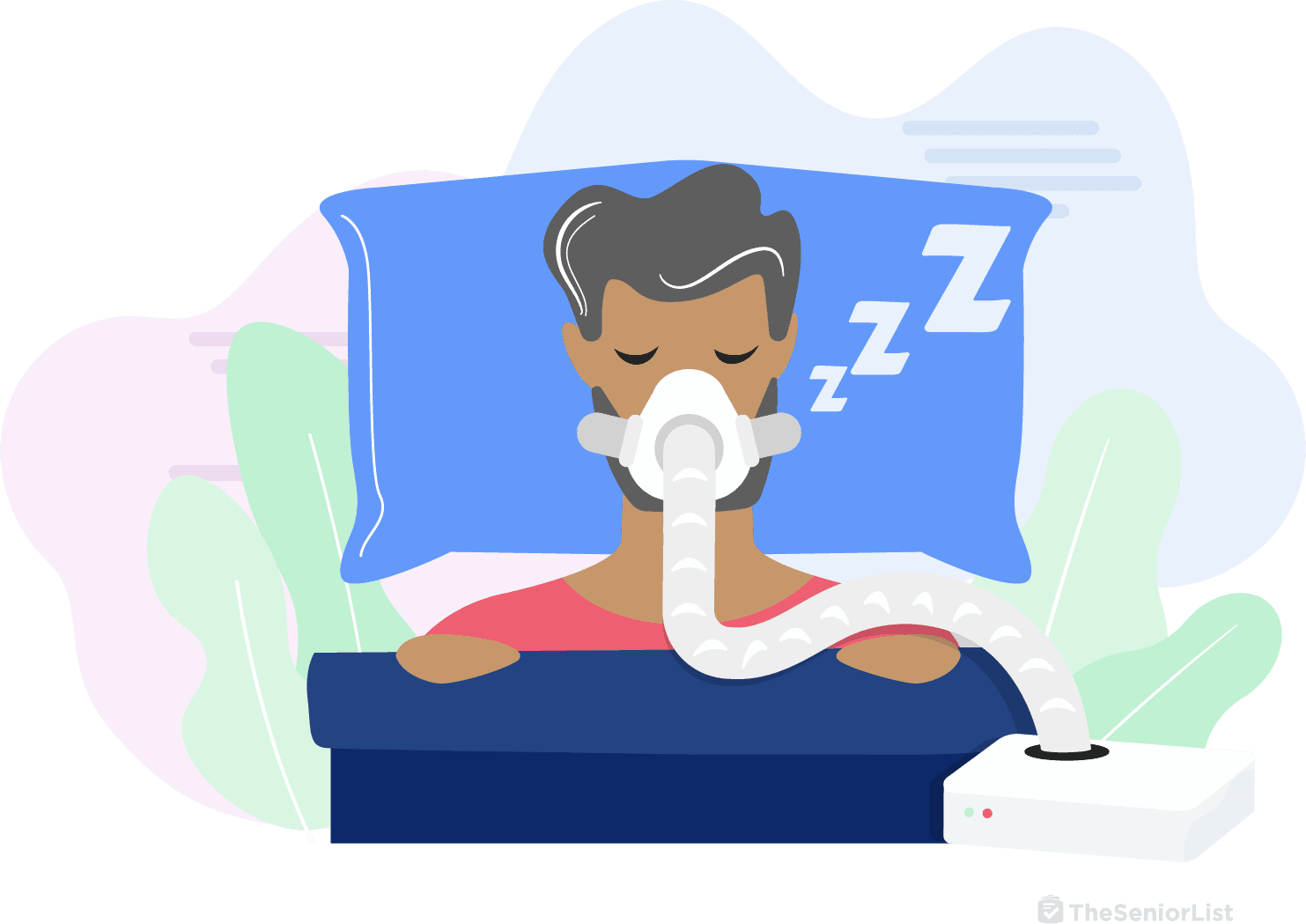Does Medicare Cover CPAP Machines in 2024?

Under certain circumstances, Medicare can cover approximately 80 percent of the cost of CPAP therapy for patients diagnosed with obstructive sleep apnea. Additionally, if you’ve rented a CPAP machine through Medicare for at least 13 months, you can own the machine — as long as you meet the deductible and work with a provider that accepts Medicare.
Medicare CPAP Coverage
If you are diagnosed with obstructive sleep apnea, Medicare can provide partial coverage for three-month trial of CPAP therapy. In some cases, Medicare can offer long-term coverage, provided a physician affirms that the device and CPAP therapy are making a difference.
Medicare can cover durable medical equipment (in this case, your CPAP machine) only if your doctor or supplier is enrolled in Medicare. Your coverage for CPAP therapy comes from Medicare Part B, which includes durable medical equipment or CPAP machines for sleep apnea.
Typically, you’ll still be responsible for paying 20 percent of the Medicare-approved amount. This includes renting the CPAP machine and accessories after you meet the Medicare Part B deductible ($226 for 2023). Additionally, if you had a CPAP machine before receiving Medicare, you may qualify for CPAP coverage for the machine or accessories under certain requirements. If you have a Medicare Advantage plan, coverage and eligibility may vary, so you might want to contact your plan.
Pro Tip: Patients with health conditions such as sleep apnea or COPD may require the use of oxygen therapy treatments. Read my article, Does Medicare Cover Portable Oxygen?, to learn about which types of oxygen therapy are eligible for coverage.
Cost of a CPAP Machine with Medicare
| Average cost of a CPAP machine | Medicare coverage | Out-of-pocket cost | Deductible | Total cost to you |
|---|---|---|---|---|
| $850 | 80% | 20% | $226 | $373 |
The average cost of a CPAP machine without Medicare can be around $850. If it qualifies as Medicare-approved durable medical equipment, Medicare can potentially cover 80 percent of the cost, provided you meet your Part B deductible and pay any remaining costs for tubes and other accessories.
Typically, Part B assistance can go toward a three-month trial coverage for a CPAP machine if you’ve been officially diagnosed with obstructive sleep apnea and your doctor documents that the device is improving your health. Medicare can pay the cost of the CPAP machine rental for the first 13 months, provided that you use it on a regular basis. After that period, you’ll own the device.
Medicare Advantage and CPAP Machines
If you’re enrolled in a Medicare Advantage plan, you might receive additional support and coverage for CPAP machines and accessories. Contact your plan to learn more about this potential coverage.
Pro Tip: If you’re looking for extra support and the chance to resume some of your daily activities, a durable and lightweight portable oxygen concentrator might be a good option. Check out my list of the best portable oxygen concentrators to learn more.
Medigap and CPAP Machines
Medigap, also known as Medicare Supplemental Insurance, covers the gaps of Original Medicare and can provide additional coverage related to CPAP therapy. For instance, certain Medigap plans –– in tandem with Medicare coverage –– might be able to cover the full cost of CPAP machine rentals or accessories needed for the machine for your sleep apnea, as long as your physician certifies that it is medically necessary and is improving your health.
Pro Tip: There are currently 10 different types of Medigap plans offered by private insurers. To help you get started, read my list of affordable medicare supplement plans.
CPAP Equipment and Medicare Coverage
Before you look into CPAP machines and CPAP therapy, check to see how much you’d have to pay out of pocket and what’s covered by Medicare. We’ve compiled a helpful breakdown of what to except for Medicare coverage of CPAP equipment:
What Medicare covers:
- Part B provides durable medical equipment coverage for a three-month trial for your CPAP machine. Patients need to be diagnosed with obstructive sleep apnea to qualify for short- or long-term coverage.
- Medicare can pay for a CPAP machine rental for the first 13 months, given that you’re using it on a regular basis. After renting it for 13 months, you will own the device.
- To qualify for coverage, both the CPAP machine and accessories must be obtained from a Medicare-approved supplier; otherwise, you may be responsible for additional out-of-pocket costs.
- Medicare can cover a CPAP machine if your doctor documents that you may need it longer than the three-month trial.
- Medicare will pay 80 percent of the cost of CPAP machines and certain supplies.
What Medicare doesn’t cover:
- Some accessories such as tubing or face masks might not be fully covered.
- You’d still be responsible for 20 percent of any remaining costs that are not covered by Medicare. Additionally, if the services are not Medicare-approved, you may need to pay more out of pocket.
Medicare and CPAP Accessories
Once you’ve met your deductible and requirements, Medicare will cover 80 percent of the cost of CPAP services and accessories. For accessories, this includes face masks, filters, and tubes, among other things.
To maintain and keep your CPAP accessories up-to-date, you may need to replace them from time to time. According to the Department of Health and Human Services (HHS), certain supplies for CPAP and other accessories are replaced on “the basis of medical necessity.” This can vary widely by state and whether your provider can provide a Medicare-approved amount of coverage for CPAP accessories.
As an example, CPAP tubing with a heating element can be replaced every three months, compared to a nondisposable filter, which needs to be replaced every six months. According to HHS, Medicare will cover the following CPAP accessories:
- CPAP tubing with a heating element: one per three months
- Combination oral/nasal CPAP mask: one per three months
- Replacement oral cushions: two per month
- Replacement nasal pillows: two per month
- Full face mask: one per three months
- Full face mask interface: one per month
- Cushion for nasal mask interface: two per month
- Nasal interface: one per three months
- Headgear: one per six months
- Chinstrap: one per six months
- Tubing: one per three months
- Disposable filter: two per one month
- Nondisposable filter: one per six months
- Humidifier water chamber; one per six months
Sleep Apnea and Medicare
Navigating coverage for sleep apnea can be tricky, but luckily, Medicare often picks up a majority of the cost. If you’re diagnosed with obstructive sleep apnea, you may qualify for CPAP therapy, including routine accessories for your CPAP machine.
If you already have sleep apnea and are considering a backup oxygen concentrator, there are plenty of affordable oxygen concentrators to consider. While there may be certain restrictions and requirements for Medicare coverage of your CPAP machine, it will definitely offer some form of assistance.
To learn more about Medicare coverage, check out our helpful guides:
Medicare and CPAP Frequently Asked Questions
-
How much does a CPAP machine cost with Medicare?
If the average CPAP machine costs $850, and Medicare covers 80 percent of it, then you’ll have to pay $170; however, you’ll also have to account for the Medicare Part B deductible, which is $203 in 2021, meaning your total cost may be up to $373.
-
Will Medicare pay for a new CPAP machine?
In general, Medicare will pay for a new CPAP machine every five years. Additionally, Medicare will pay for a replacement only if the device is lost, stolen, or damaged. Also, Medicare will consider replacing it if it’s less than five years old and does not operate properly.
-
When can I get a new CPAP machine with Medicare?
You can usually get a new CPAP machine after five years, unless there are certain issues, such as damage or theft, that require a new machine.
-
How often can I get a CPAP machine with Medicare?
If you are officially diagnosed with obstructive sleep apnea, you can get a three-month trial for CPAP therapy/CPAP machine. In general, you can get a CPAP machine through Medicare every five years, though there may be certain requirements. Additionally, Medicare can cover the cost of durable medical equipment, or your CPAP machine, for approximately 13 months, so long as you are regularly using it during that span. You can own the machine after 13 months have passed.
-
Does breathing through your nose help sleep apnea?
Breathing through nasal strips might temporarily help individuals with sleep apnea, but it’s not a permanent solution for breathing or severe obstructive sleep apnea issues.


